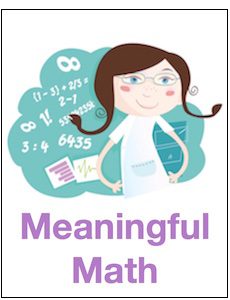Fresh Ideas to Deepen Student Connections
A MiddleWeb Blog
This is the time of year I try to assess how well I did on the goals I set at the beginning of the school year and make changes where necessary.
The two weeks we have off this time of year gave me the chance to recharge my batteries and reflect on my progress on those three goals from the fall:
- Get to know my math students in more than a superficial way
- Use formative assessment effectively
- Be enthusiastic and inspire enthusiasm in my classroom.
Of the three, I feel like getting to know my students better is the area where I have made the least progress. I’m not sure why this particular goal has been such a struggle.
Time is always a factor. There’s just never enough time in math class, and it can be hard to take even a few minutes to just talk to students. Class size can also be a factor. When I have a class that’s smaller, I always feel I get to know my students better.
Getting from knowing to understanding
 The main reason I have struggled with this goal, however, is because I didn’t set any actionable steps to accomplish my goal. I just had a vague notion that I wanted to get to know my students better.
The main reason I have struggled with this goal, however, is because I didn’t set any actionable steps to accomplish my goal. I just had a vague notion that I wanted to get to know my students better.
Also, now that I think about it, the goal probably should have been to build relationships with my students – not just “get to know them better.” I genuinely like my students. I think overall they are hard-working, intelligent, and good natured, and I want them to know that.
Why are good relationships important?
I know that math can be intimidating for some students, and I want my students to feel comfortable in my classroom and feel like it is a place they can learn. I want them to look forward to coming to my class each day. Being honest with myself, I’m pretty sure that some students don’t always feel that way, but I’d like to change that.
I also want to know my students better so that I will be aware if there are things in their lives away from school that are making it hard for them to learn.
It’s heartbreaking to discover that the student who comes in and puts their head down is tired from babysitting younger siblings all night. Or that the student with a bad attitude is upset because their parents are getting a divorce. I want to know what my students are dealing with so that I can treat them fairly and compassionately.
So, for the rest of the school year, I want to concentrate on building relationships. The question is – with half of the school year gone, what can I do?
Looking forward: 3 action steps
Fortunately, I have had some time to read the last few weeks, and there have been several good articles recently dealing with this subject. One in particular, Relationships Matter: Beyond the Curriculum by Kelisa Wing, was very helpful. Her article listed practical suggestions to help build better relationships with students. I adapted her suggestions and devised three actionable, concrete steps to implement in my classroom.
√ A more comprehensive survey
 First of all, I plan to start the next semester with an interest survey that I will ask students to fill out. I actually had my students fill out a short survey at the beginning of the year, but it was not very comprehensive. Also, I plan to commit enough time to read the surveys so that I can talk to them individually about their replies.
First of all, I plan to start the next semester with an interest survey that I will ask students to fill out. I actually had my students fill out a short survey at the beginning of the year, but it was not very comprehensive. Also, I plan to commit enough time to read the surveys so that I can talk to them individually about their replies.
I found this survey which I think will be a good one. Among other things, the survey asks students to list extracurricular activities such as clubs, watching siblings, chores, or part-time jobs. In addition, it asks students how teachers can capture their interest as well as whether they prefer learning in small groups or large groups. Maybe we’ll have some group chat about that.
√ Learning from parents
Second, I will increase parent communication. There are several reasons that parent communication is directly related to improved student/teacher relationships. First, I want to talk to parents to find out what outside pressures my students are facing. Family members can provide useful insight into students’ actions.
 Also, I want to enlist families to help celebrate my students’ successes. According to Kelisa Wing, “it is our job to celebrate our students’ accomplishments.” A call home to parents is a great way to do this. That doesn’t mean just calling home when students have an A or make 100 on a test; it means calling home when a student improves their grade from a D to a C or makes some other incremental advance.
Also, I want to enlist families to help celebrate my students’ successes. According to Kelisa Wing, “it is our job to celebrate our students’ accomplishments.” A call home to parents is a great way to do this. That doesn’t mean just calling home when students have an A or make 100 on a test; it means calling home when a student improves their grade from a D to a C or makes some other incremental advance.
It’s important to celebrate effort and hard work, as well as achievement. To make this a reality, I plan to use part of a designated work day to make phone calls/send e-mails to families. I also plan to commit one afternoon each week to making contact with parents.
√ Raising expectations
Lastly, I plan to set high expectations for all students. Another great Edutopia article I read recently was The Warm Demander: An Equity Approach which talks about the right ways to challenge students and makes a convincing argument that students appreciate it when teachers set high expectations for them because it shows that we believe in them.
Warm demanders are teachers who, in the words of author Lisa Delpit, “expect a great deal of their students, convince them of their own brilliance, and help them to reach their potential in a disciplined and structured environment.”
I thought for a while about how to implement this and decided to do it via student conferences. I plan to meet with each student for a few minutes and set a goal for the 2nd semester. I plan to have students write their goal on a sticky note, and I am going to display the notes on our front bulletin board as a reminder to them and me.
I want my students to know that I believe in them, and I know that they can accomplish great things. I also want them to realize the importance of taking ownership in their own learning by setting goals.
My second semester plan
2017 will begin with my fresh strategies:
- Interest survey followed by a real conversation with students.
- Regular contact with parents to learn about students’ lives away from school and to celebrate their successes.
- One-on-one student conferences to help students appreciate the high expectations set for them.
How are you building deeper relationships with your students? Do my ideas make sense?



































